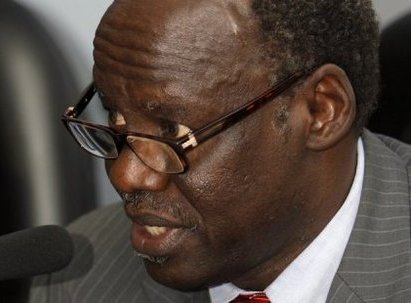S. Sudan slaps travel ban on leader of opposition parties
September 13, 2014 (JUBA) – South Sudan government on Saturday blocked the leader of opposition parties taking part in its ongoing talks with rebels in Ethiopia, despite an invitation extended to the latter by the Intergovernmental Authority on Development (IGAD).

“I have been blocked. They told me that they have instructions that I should not travel to attend the talks,” Akol exclusively told Sudan Tribune.
The opposition leader insisted he was still head of the political parties’ leadership.
“I have not been removed. What happened was that some of the political parties in the government called the meeting engineered by the government because government wants to use them as proxy delegation at the talks,” said Akol.
“It was not the political parties meeting,” added the opposition parties’ head.
Akol further claimed government’s decision to block him clearly shows it was opposed to independent views to resolve the conflict.
“The message is clear. The government does not want independent views,”he said.
The political parties, at a meeting chaired by president Salva Kiir Friday, resolved that Akol be removed from the delegation to the talks and named Martin Tako Moyi as his successor.
PUBLIC REACTIONS
Several observers and members of the public reacted differently to this new development, with government supporters welcoming the decision, which they described as the right decision at the right time.
“The decision of the political parties to remove Lam Akol is right decision because he was causing confusion within the leadership of the political parties. Actually he was representing the views of the political parties. The political parties did not go to demand positions in the government at the talks but they were simply going to help the way this conflict can resolved,” said James Makuek, a member of South Sudan’s ruling party (SPLM).
Makuek claimed Akol used the peace talks as an opportunity to settle political scores with the government in the name of other political parties instead of prioritising settlement of the conflict.
But Deng Bol, a native of Northern Bahr el Ghazal in Juba, said he was not surprised of the behaviours of some of the political parties because they were already within government.
“You honestly do not need to ask the motives behind all these confusion. The motives are obvious. What happened as you may have followed political events was a clear fight for allegiance between those in the government, who do not want the government to cut their cake and those who were advocating real reforms so that they can get a political space to propagate their activities in the new political environment when peace talks are concluded with the signing of the agreement,” said Bol.
He claimed those who were in government, but were removed in last year’s cabinet reshuffle; find it hard to live a common man’s life.
“This group wants to return the government by all means. They are working hard to grab the attention of the government by supporting whatever the government says. So Lam Akol cannot survive in this environment especially that he seems to advance independent views,” added Bol.
Anthony Sebit, a Juba based political commentator, equally described the development as a competition between political interest and those advocating for “creation of political space”.
“Let me put it bluntly that these developments are activities of people wanting to retain their current positions in the government at any cost. You see clearly that people who were appointed as members of Parliament by the president, without having contested any parliamentary seats anywhere in this country as well as the case those who are currently holding cabinet positions in the government,” said Sebit.
“Do you expect such people to shoot themselves by supporting views which are against the very government which settles their monthly bills? No. It would be a political suicide if they do so,” he added.
(ST)
